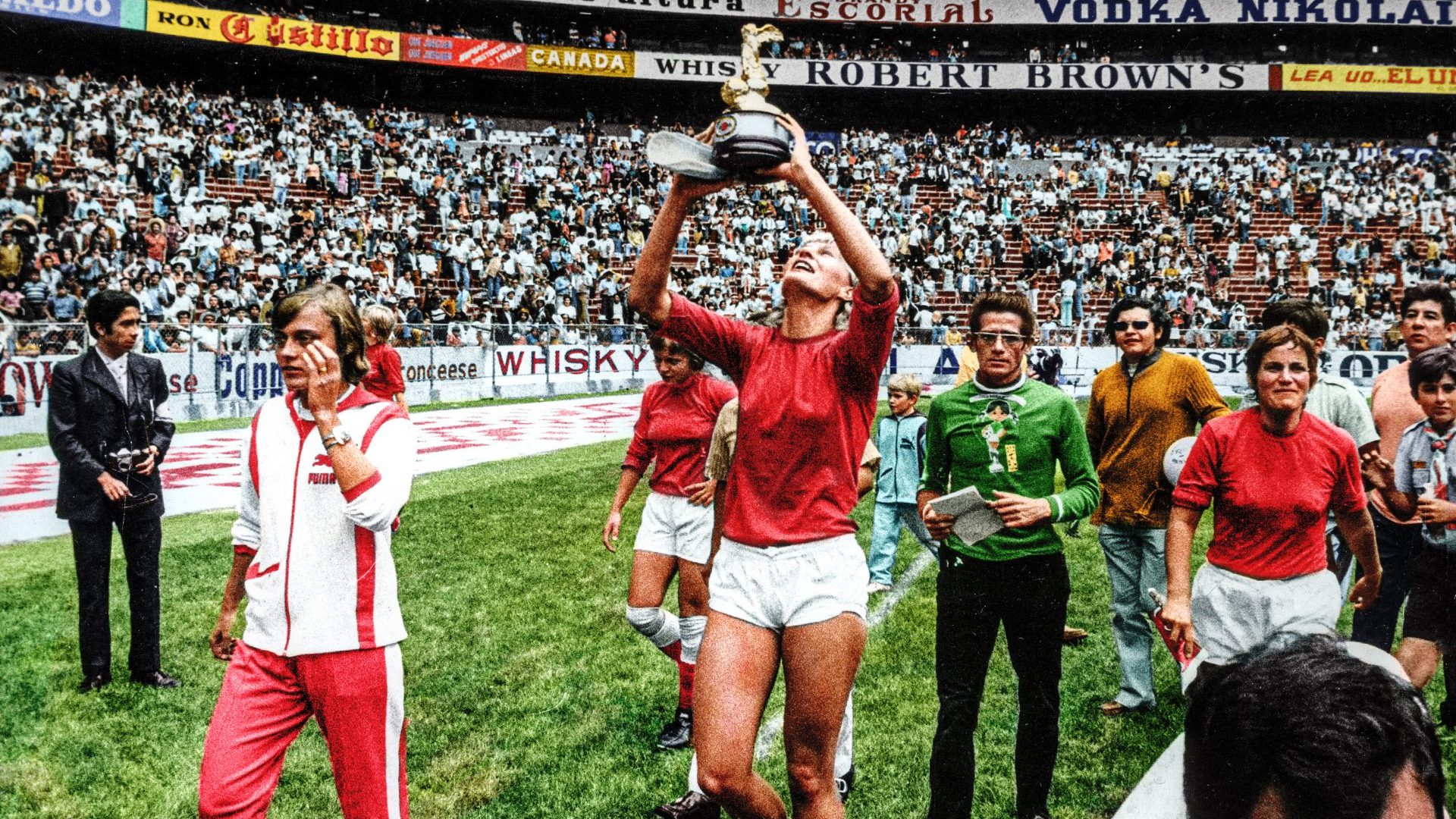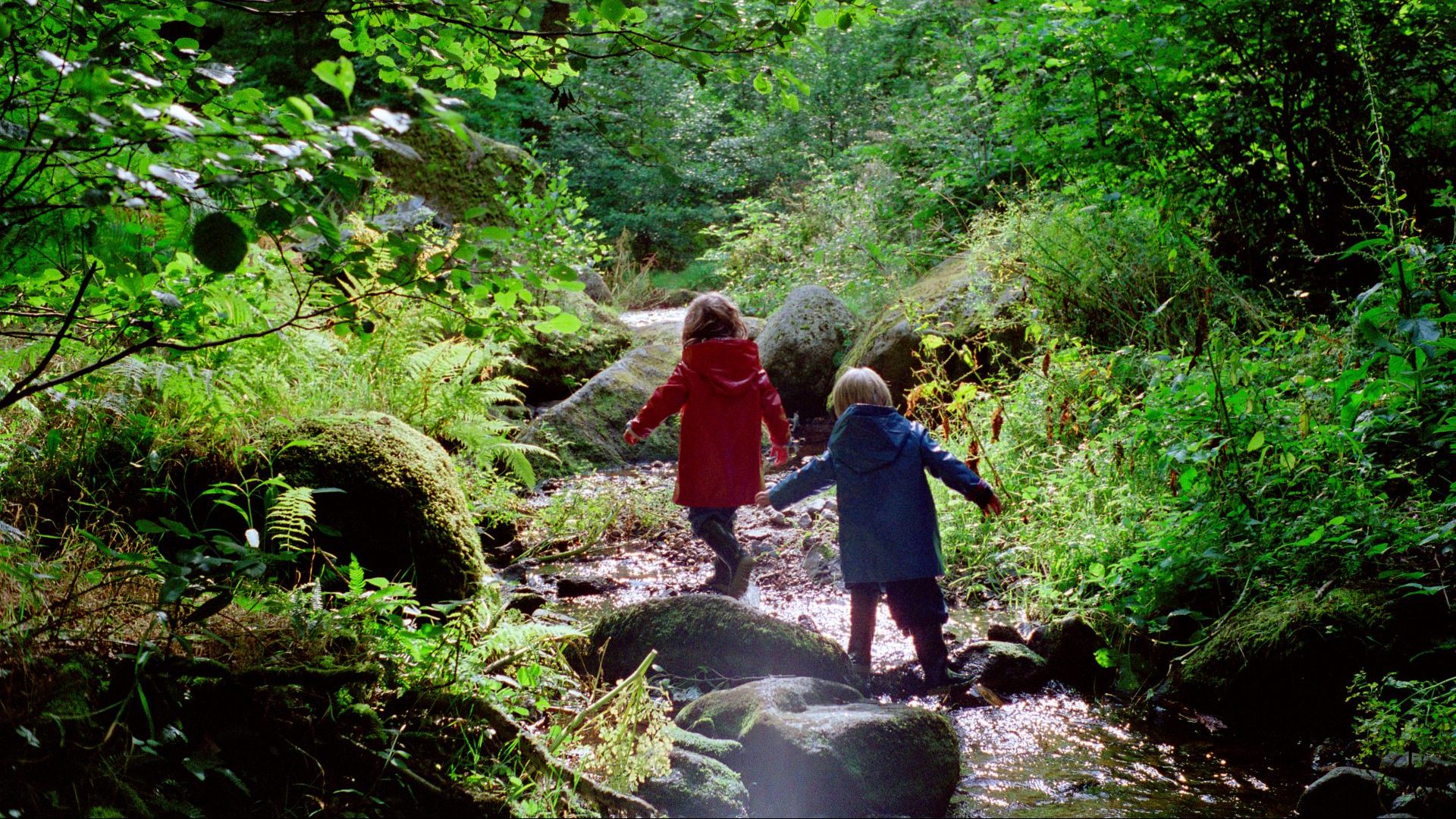How has one of the biggest tournaments in the history of football been dismissed, forgotten, sidelined?
Even with more than 100,000 fans there to witness its key matches in one of the great football stadiums – the iconic Azteca in Mexico City – most of the images and match footage have never been seen, and the stories of the players never been told. You probably don’t even know any scores.
This is because Copa 71 is the story of the first Women’s World Cup, told in a new documentary that will have you up on your feet cheering as well as shaking with a mix of rage and disbelief. With great flair, a cast of compelling characters telling their personal stories and a rocking 70s soundtrack from Carole King and Kiki Dee to blues singer Koko Taylor, it’s one to see in the cinema, with a crowd.
“We wanted to capture a communal experience, to recreate the feeling these amazing women had playing in a tournament of such magnitude,” says the film’s co-director Rachel Ramsay. “But it’s not a traditional sports doc – it’s not about one underdog triumphing against the odds. It’s a film about sisterhood and living through a collective experience, and the trauma of it not being taken seriously.”
But looking at the games, all shot in that wonderful, bright colour TV grade we associate with the men’s World Cup that exploded the modern football era into life with that golden Brazil side of Mexico ’70, you see a high standard of football that was being lapped up by huge crowds, creating a media frenzy.
There was even a specially created mascot, Xochitl, a warrior queen character from Aztec legend who adorned mugs and key rings, pennants and T-shirts.
The film’s other director, James Erskine, agrees: “The competitive nature of the matches, the toughness and the skill is compelling. It makes it all the more extraordinary that afterwards, people could dismiss it and say the women’s game wasn’t interesting, wasn’t worth watching, that no one would come. It was genuine football fever and here’s the proof of it.”
Remarkably, a good deal of the filmed footage was only recently discovered in a loft in Mexico City. It’s the sort of “found film” story that has powered documentary successes such as Asif Kapadia’s Diego Maradona – hours of video discovered in a Naples skip – and the Oscar-winning concert film Summer of Soul, footage of which was never screened because of the disinterest of white TV and movie executives in black music.
“We could see in photos and in some TV coverage, that there were all these people in the crowds with their own cine cameras,” recalled Ramsay. “So we put out a rather hopeful social media message, thinking maybe we’d get some atmospheric background for some colour and we got this wonderful, vibrant trove sent to us on a computer link. Seriously, a bloke called Pablo had found the reels of film when clearing out his grandfather’s attic and he’d set about digitising it himself.”
A great story in itself, the found footage merely amplified the fizzing energy of this tournament, its global scale, the local interest – Mexico had one of the best teams whose progress clearly captured the host nation’s hearts – and the celebratory atmosphere. Adds Erskine: “Primarily, though, we saw it as an opportunity for these players to have their voices heard, and their experiences acknowledged for the first time.”
Interviewees span around Europe, including France, Italy and Denmark, as well as the England team members, most of whom had not seen or spoken to each other for over 50 years since returning from Mexico. The women talk about Mexico variously as: “a fairytale”; “magical, like having wings”; “a taste of freedom”; “the most beautiful thing in my life”.
These included England captain Carol Wilson, who was just 19 years old at the time of the tournament. The press photos of the women on the road in Mexico, in hotels and bars and in publicity shots to promote the matches during the tournament, are fantastic in terms of the haircuts and fashions, and in the way they capture this extraordinary adventure.
“Most of us had never left home before, and not been on a plane before,” says Newcastle-born Wilson now. “We were mainly working-class lasses and it really wasn’t accepted that girls should even play football, and certainly we never had proper pitches or anyone coming along to see us.
“Imagine how we felt to get to Mexico and see all these other women together, from around the world, all of us there to play in this huge, famous and full stadium. I had tears on my cheeks.”
For Wilson, this turned to a nightmare when she returned to England. Not only were the players banned for having participated in what Fifa deemed an unofficial tournament, but she was invited to Newcastle for what she thought was a celebration dinner and reception in her honour, only to be mercilessly teased by the comedy compere host, facing joke after joke about girls playing football. It broke her heart and it would be years before Wilson played again or even spoke about Mexico.
“I think so many women would recognise that moment,” says Rachel Ramsay. “It’s what it’s like to be silenced, to have your lived experience taken away and denied, to be gaslit.
“We quickly discovered when we started interviewing these women that they were significantly traumatised by what happened to them after the tournament – having gone off and experienced something so glorious that they thought was about to change the world, they got back home and were silenced, banned, laughed at and the whole thing buried.”
But the documentary never feels angry. You get swept up in the camaraderie and the games, the colours and the characters, such as Silvia Zaragoza from Mexico, whose father used to beat her for playing football; and Elena Schiavo from Italy and Nicole Mangas from France who remembers how her Reims team was originally created to play before men’s games with the “aim of making the crowd laugh”; as well as Danish pair Ann Stengard and Birte Kjems.
It becomes a reflection on changing attitudes to women, yes, and to women’s football, but also a meditation on youth, history and acceptance.
Erskine has made a career in sports docs including One Night in Turin, the story of England’s Italia 90 loss to Germany and Gazza’s tears, The Ice King about Olympic champion figure skater John Curry, as well as The Battle of the Sexes, based on the tennis match between Billie Jean King and Bobby Riggs in 1973.
However, he says, this new film required a different approach: “The thing with sports films is to get the audience feeling the same emotions at the same time, like at a football match, so we wanted that but we also wanted the reactions to not be about the goals or the results of the matches and who went on to win, but to feel like as you watch it, you’re actually immersed in the tournament, living through it.”
As Ramsay adds: “So when the crash comes, and the tournament’s over, the dream fades and it’s taken away from the women, it’s the audience who also feel it being taken away from them, so they feel the pain, the anger of being repressed and having their voices denied and they go: ‘Hey, I saw it with my eyes, I lived it, you can’t deny me, you can’t bury my story’.”
So, Copa 71 is a film of two halves. There’s the time capsule snapshot of history and then there’s the burying of it, the dismissal of it and you feel a deep regret for what might have been, what should have been for women’s football after such a vibrant tournament. As Erskine points out, the attendance for the final – between Mexico and Denmark at the Azteca – is the highest ever recorded for a women’s sporting event.
However, I write this as crowds are flocking to the Emirates Stadium for Arsenal’s north London derby with Spurs, the third time this season that over 60,000 have packed the stadium for WSL matches, the Holloway Road a sea of families in Mead and Russo shirts.
There’s a particularly poignant moment, I found, in the documentary when the English women are telling of their first game at the tournament and how they were in the team hotel afterwards in Mexico City, and all got round the hotel TV to watch their next opponents play, live from the tournament’s other venue, the Jalisco Stadium in Guadalajara. Says Wilson: “We realised we’d never seen a women’s game on the TV before, that this was the first time we could watch people like us playing, with commentators and crowds and it was just an incredible feeling.”
The first Women’s World Cup remains unofficial as far a Fifa is concerned. But its competitors, its winners and pioneering players are finally getting the chance to look back on it, to tell their stories and rekindle their justifiable pride in taking part.
“We hope these pioneers will now be recognised for what they did,” says Ramsay. “Obviously, to see the film going into cinemas in Denmark and Italy and getting the support of the audience and official bodies, that is very exciting, but we also acknowledge they are only part of the story and that there were plenty of women who came before them whose stories have not been told, as well as plenty after them.”
For now, Copa 71 recognises the achievements of the women who took part in an amazing moment in sporting and social history, bringing it all back to glorious life the way only cinema can.
Copa 71 is in UK and Irish cinemas




